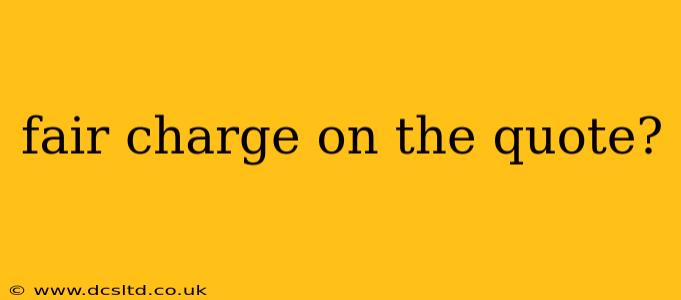Determining a Fair Charge on a Quote: A Comprehensive Guide
Getting a fair quote for any service is crucial. Whether you're hiring a contractor for home renovations, a freelance writer for content creation, or a consultant for business advice, understanding what constitutes a fair charge is essential to avoid overpaying or undervaluing the work. This guide will help you navigate the complexities of quote evaluation, ensuring you receive the best possible value for your money.
What factors determine a fair price?
Several key factors influence the fairness of a quote. Let's break them down:
-
Scope of Work: The most fundamental factor is the extent of the job. A detailed description of the work involved, including all tasks, materials, and deliverables, forms the bedrock of a fair quote. Ambiguity here can lead to disputes later. The more comprehensive the description, the better.
-
Experience and Expertise: Experienced professionals often charge more due to their skillset, efficiency, and established reputation. A novice may offer a lower price, but their work may lack the quality or speed of a seasoned expert. Weigh the value of experience against the cost.
-
Market Rates: Researching industry averages for similar services in your area is vital. Online resources, industry associations, and professional networks can provide benchmarks to compare against the quote you've received.
-
Materials and Resources: The cost of materials, equipment, software, or other resources used in completing the project should be transparently included in the quote. Be wary of quotes that seem suspiciously low and lack detailed breakdowns of these costs.
-
Time and Effort: Consider the estimated time required to complete the work. A complex project naturally demands more time and, consequently, a higher charge. A reasonable quote will reflect the time investment involved.
How can I tell if a quote is too high or too low?
A quote that is too high might indicate:
- Unnecessary or inflated costs: Scrutinize the breakdown for any unnecessary expenses or overcharges for materials or labor.
- Lack of transparency: Avoid quotes that lack detail or are unclear about the services included.
- Overestimation of time and effort: Compare the estimated time with your own assessment of the project's complexity.
Conversely, a quote that is too low might suggest:
- Compromised quality: A significantly low price may indicate that corners will be cut or substandard materials will be used.
- Hidden costs: Be cautious of unusually low quotes; hidden fees might emerge later in the process.
- Lack of experience or expertise: While a lower price might be tempting, it's crucial to assess the provider's qualifications to ensure they can deliver the desired results.
What questions should I ask before accepting a quote?
- What is included in the quote? Ensure all aspects of the project are clearly defined.
- What is the payment schedule? Understand the payment terms and milestones.
- What is the warranty or guarantee? Ask about guarantees on workmanship or materials.
- What happens if unforeseen issues arise? Discuss contingency plans for unexpected problems.
- What is the provider's cancellation policy? Protect yourself in case you need to cancel the agreement.
How can I negotiate a fair price?
Negotiating a fair price is perfectly acceptable, especially if you've identified areas for potential cost savings or have received multiple quotes. Approach negotiations professionally and respectfully, focusing on factual concerns rather than aggressive tactics. Be prepared to justify your position with research and reasoned arguments.
By carefully considering these factors and asking pertinent questions, you can confidently assess whether a quote is fair and makes sound financial sense before committing to any project. Remember, a fair quote reflects both the value of the service and the provider's expertise, leading to a mutually beneficial and successful outcome.
